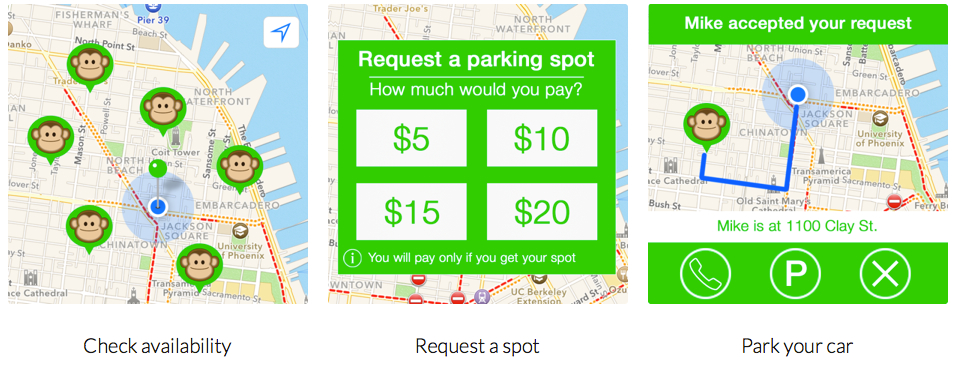NYC has lots of cheap parking spaces. The result? I (and many like me) have circled blocks, added to greenhouse gases, used precious hours and exacerbated congestion, all to find an empty muni-meter or free spot. As UCLA Professor Donald Shoup has said through his book, The High Cost of Free Parking, cheap city parking can be rather expensive.
Now, with MonkeyParking, I wonder whether we are lowering the cost.
MonkeyParking is a recent addition to the sharing economy. Initiated in San Francisco, a MonkeyParking app pairs someone looking for a space with a person who is parked on the street. Starting at $5, you can pay up to $20 through an online credit card transaction, zoom over to the space, ask the “seller” to leave and it is yours. MonkeyParking says they also operate in Rome and will select a third city through a vote at their website.

Our bottom line? Through the negative externalities it generates, city dwellers experience too high a cost (sacrifice) for cheap parking. Perhaps, by raising the price of city parking, MonkeyParking is actually lowering the cost.
Do you think MonkeyParking is creating a positive externality or will selling a spot you do not own lead to unexpected consequences? Please let us know in a comment.
How Can You Add Value to Your Free Parking Space?

Elaine Schwartz
Elaine Schwartz has spent her career sharing the interesting side of economics. At the Kent Place School in Summit New Jersey, she was honored with an Endowed Chair in Economics. Just published, her newest book, Degree in a Book: Economics (Arcturus 2023), gives readers a lighthearted look at what definitely is not “the dismal science.” She has also written and updated Econ 101 ½ (Avon Books/Harper Collins 1995) and Economics: Our American Economy (Addison Wesley 1994). In addition, Elaine has articles in the Encyclopedia of New Jersey (Rutgers University Press) and was a featured teacher in the Annenberg/CPB video project “The Economics Classroom.” Beyond the classroom, she has presented Econ 101 ½ talks and led workshops for the Foundation for Teaching Economics, the National Council on Economic Education and for the Concord Coalition. Online for more than a decade. econlife has had one million+ visits.





